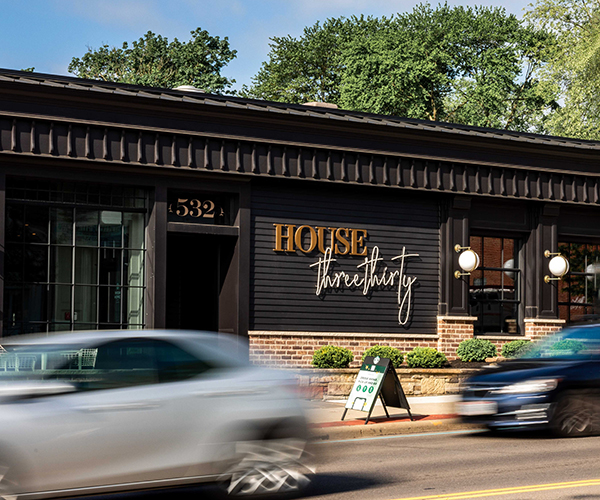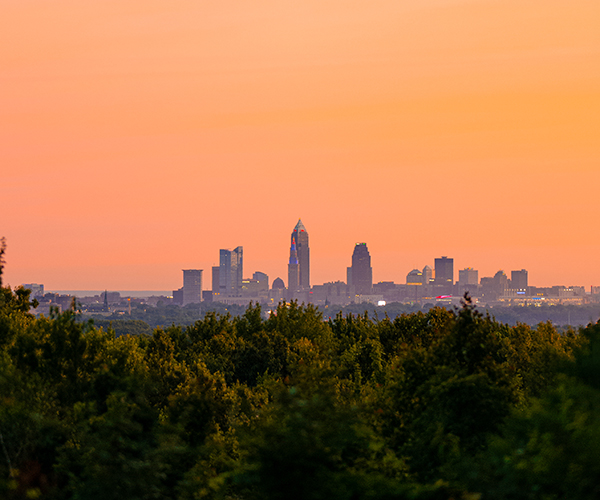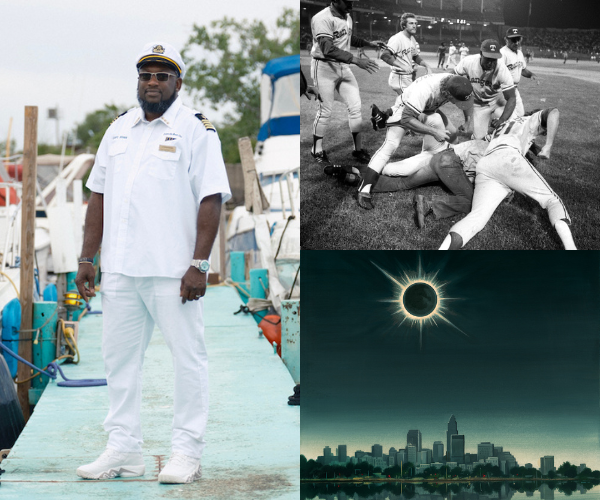A simple mall cart.
Maybe 5 feet by 8 feet, it rests in an empty aisle, dwarfed by the Galleria’s mostly vacant 230,000 square feet of space. But with its bulbous, sausage-shaped black bags, the growing capsules for lettuce and herbs, that little mall cart is the centerpiece of a master plan aimed at doing more than just reviving a glass-encased retail graveyard.
The Galleria wants to be Cleveland’s center for green technology, a giant greenhouse where schoolkids can visit and an educational center where visitors will flock to see sustainable techniques and practices in one easily accessible spot.
It sounds tourists-from-a-turnip crazy, right?
Not for Vicky Poole, a marketing director with an artist’s eye who launched the Gardens Under Glass idea for the floundering Galleria at Erieview. And not for the Civic Innovation Lab either. The local nonprofit awarded Poole a $30,000 grant to seed her project.
She used the first half of her newly acquired funds to purchase Amish seeds, hydroponics equipment and that lettuce cart. The other $15,000 will go toward more hydroponics, railing systems, perhaps even a vertical growing system — a living wall that conserves space and utilizes the Galleria’s soaring ceilings.
While the garden is growing, Poole and Werner Minshall, the Galleria’s owner, hope that something else will grow, too: business.
At 57, Poole is a petite blonde with perfectly coiffed hair and sparkly eyes. She’s used to making something out of nothing, the kind of gal who’ll grab a castoff chair from someone’s tree lawn and reupholster it herself rather than head to Ikea.
As a visual merchandiser, she’s spent decades doing the same thing with retail spaces.
“I think that’s what my forte is,” she muses. “You think, OK, what do I have that I can use to make this space fantastic without having to go out and get anything?”
In the ‘90s, she began creating window displays and holiday installations for former Indians owner and developer Dick Jacobs’ Jacobs Group, whose properties included the Galleria. When Minshall Development Co. eventually bought the building and brought Poole on full time, Minshall saw a woman who could take on the challenges of the Galleria.
“It really isn’t a mall anymore,” he says. “It is the lobby for the office building tenants, and, as such, it has to stay vibrant.”
So Minshall encouraged Poole to think big, to brainstorm the Galleria’s salvation. She started hosting events such as the sprawling Scrooge’s Night Out gala. And it was her harebrained, but ultimately successful, idea to put up curtains five years ago — in the food court, of all places — and host weddings. When too many brides objected to the large red soffit ensconcing the room, she came in one weekend, hauled out a lift from storage and repainted the entire thing herself.
It was one small step, but it proved something: Minshall was right. Poole had the brain and the energy the Galleria needed.
Empty storefronts are bad, and the Galleria echoes with plenty of them. It’s a far cry from the building’s debut in 1987 as a destination shopping center. “What I wish people would do is stop looking at it as a mall,” Poole says. “Our lifestyles have changed dramatically in the past 20 years.”
People shop where they live now. The Crocker Parks and the SouthPark shopping malls of the suburbs are the realities that downtown developers face. So what’s a former urban beacon to do? Poole chose to model her building after a boat. New York’s Science Barge is a floating urban farming experiment. Little greenhouses are perched onboard, welcoming the public to learn about sustainable farms and renewable energy.
“The Science Barge was one of the big tourist attractions in New York City, and I thought, Well, why couldn’t we be a tourist attraction?” says Poole. She looked around and realized she was coming to work in a ready-made greenhouse every day.
She brought the idea to Jack Hamilton, whose magazine, Artist Review Today, is one of the Galleria’s remaining tenants. Hamilton laughed. Then he got serious. He wrote a grant for Gardens Under Glass. Poole fine-tuned it, and they submitted their proposal to the Civic Innovation Lab. “I’ll be darned if we weren’t number five out of 90 projects,” Poole says.
The Lab’s board got it. “It connected to me because it’s really the right time at the right place for the community, and it’s really the type of thing that should be done nationwide,” says Thomas Mulready, Lab member and CoolCleveland creator.
Or, as Poole puts it, green has become way more than just a color. She’s already initiated recycling throughout the Galleria with composting coming soon. Eventually, the building’s only nonrecyclable trash will be plastic foam, lids and straws. Rainwater will be reused on plants. All of these organic threads, woven together, form the foundation that Poole and Minshall believe will draw eco-friendly tenants into the space.
“This gardening concept,” Minshall says, is “kind of a kickoff to the idea that you can have a downtown property that’s focused on green technologies and green businesses.”
Eventually, the lettuce cart just won’t cut it. Poole’s plan is for local restaurant owners to sponsor carts, paying for the privilege of marketing their business and getting fresh produce for their kitchens in return. But the Galleria cannot survive on sponsorships and vegetable sales alone. New tenants are a necessity. So, if Poole builds it green, will the entrepreneurs come?
“It’s sort of one of the ironies of modern life,” Mulready says. “We’re a farm state, and yet we import our food just as far as everyone else does.” It’s a sentiment that the nation is turning a watchful eye toward. Organic farms and sustainability-focused businesses are on the rise. Americans took notice when Michelle Obama planted her White House garden. Even linguists are getting in on the hubbub; in 2007, “locavore” was the New Oxford American Dictionary word of the year.
Poole is hitching her wagon on a trend, but at some point, says Minshall, that trend becomes a way of life. “We seem to be catching some of the mood of the country,” he says. “We’re at that point now where you can start seeing some viable businesses being built around green technology.” The interest is there; Poole’s already received calls from people in Washington, New York and Illinois, curious about what she’s creating.
Meanwhile, Minshall and the Lab are counting on Poole. “The saying that we always talk about at Civic Innovation Lab is that we’re betting on the jockey as much as we’re betting on the horse,” Mulready says. He stepped up as the Lab’s mentor on the project because he believes in eating local, yes, but also because he believes in Vicky Poole.
Only a quarter of the Lab’s investments are thriving after six years. Another quarter are no longer in business, and the other half, Mulready says, are still on the cusp. But that’s OK. “We’re looking at the long-term investment in Vicky and her team, and her ability to organize, as much as we are Gardens Under Glass.”
Can Gardens Under Glass succeed? Is Vicky Poole the kind of person Cleveland needs right now? The proof is in the potting.
“There are three types of people in this world,” Minshall says. “Those who make things happen, those who watch things happen and those who don’t know what is happening. … She makes things happen. In Cleveland you have too many people who are watching and not enough people who are making things happen.”



